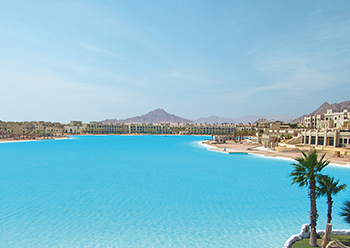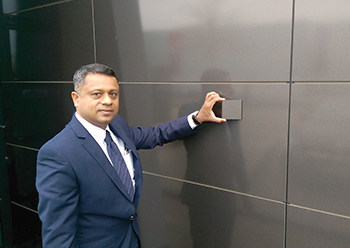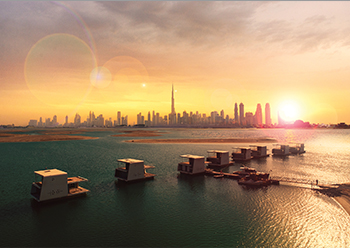
 The first phase will feature 78 Floating Seahorse Villas.
The first phase will feature 78 Floating Seahorse Villas.
When key components of The Heart of Europe in Dubai are completed by the end of this year, the idyllic sustainable project will bring the essence of Europe to the Middle East – homes, ambiance and climate et al.
The first-of-its-kind project in the GCC region, the second home and tourism island destination has a number of innovative products that have never been built before, such as Floating Seahorse Villas, the Rainy Street and the Floating Venice Island, according to Kleindienst Group, its developer. It is also expected to host the world’s first underwater hotel rooms that offer breathtaking views of the marine life.
As part of Phase One of the masterplanned project, eight beach palaces on the Sweden Island, 32 upscale waterfront villas on the Germany Island, Honeymoon Island, 78 Floating Seahorse Villas and 371 units of the Portofino family hotel are being completed by the end of this year, with the second part of this phase slated to be completed next year.
Phase Two of the Heart of Europe will be completed around 2023. The entire development will host 4,000 units spread across 15 hotels, villas and 141 Floating Seahorse Villas. The hotels, which will offer a wide variety of European experiences, will be managed by Kleindienst Group’s hospitality arm.
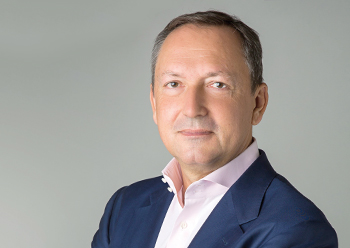 |
|
Kleindienst ... dream project. |
Being developed in line with the vision of His Highness Sheikh Mohammed bin Rashid Al Maktoum, Vice President and Prime Minister of the UAE, and Ruler of Dubai, The Heart of Europe is the brainchild of Josef Kleindienst, Chairman of Kleindienst Group, an Austrian businessman, who conceived the idea to recreate the European culture and heritage in a cluster of six manmade islands within The World islands. The World is a cluster of 300 islands developed by UAE developer Nakheel that make up a miniature version of the world.
“Currently, eight out of the 10 Sweden Beach Palaces are in the final stages of completion, with civil works having been completed and mechanical, electrical and plumbing (MEP) works under way,” Kleindienst tells Gulf Construction. “The 32 upscale Germany villas are almost complete, with all civil works completed. Portofino Hotel is currently being completed while the Floating Seahorse Villas are being rolled out of the construction site and deployed for testing, commissioning and interior works.
“The façade of the Portofino family hotel is being painted and the hanging gardens are being installed; while the waterproofing is taking place simultaneously, and the units are being fitted out.
“The Côte d’Azur resort and its four upscale hotel elevations are complete and painting of the facades is progressing.”
Once completed, The Heart of Europe will deliver a number of innovations, including the world’s first three-level floating villas and a floating island called The Floating Lido – the first in the world, Kleindienst adds.
The Heart of Europe project is being developed at a cost of $5 billion (Dh18.3 billion), with Kleindienst Group being the developer and the contractor of the project. The project is self-funded by the developer’s own resources, and payment from buyers, according to him.
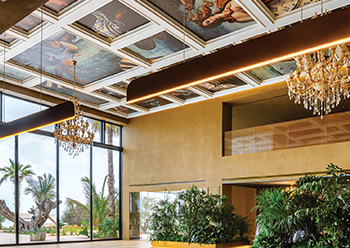 |
|
Portofino hotel: The interiors of the hotel will reflect and recreate an Italian ambiance. |
“The company is carrying out all the construction activities on its own with a team of 1,200 people. It is developing the entire project with its own resources, without borrowing money from banks. As it stands, the company doesn’t have any debt. There is no third-party involved in development,” he emphasises.
Kleindienst Group is the largest European developer in the UAE, established around 30 years ago. As a developer, the group follows a backward integrated business model, having its own architectural design team, structural engineering division, construction division, mechanical, electrical and plumbing arm as well as its own concrete batching plant – all under one roof – making it one of the most sustainable developers in the region, Kleindienst says.
The group has, however, enlisted the services for some of the leading suppliers and contractors in their field of specialisation. For instance, engineering and construction services are being provided by PSE Building Contracting; special projects/3D printing services by 3D Generation; and landscaping by Richard Westcott from Jardim Vista. Furniture is from Bentley Home Furniture; Feng Shui expertise is being provided by Master Li while the record-size sustainable swimming pool is being supplied by Silver Pool Technologies.
Other than the innovative Floating Seahorse Villas, the construction of The Heart of Europe project is implemented as other construction sites, he says.
“The group has, however, conducted additional compacting of the island for durability of the land mass and to ensure 100 years building life on the island – although the regulation is for 50 years. So, the developer has gone beyond the government regulations to ensure investors get a better value with longer building life.
“On the Floating Seahorse Villas, Kleindienst has developed an innovative concrete solution for durability of the units, which will have a warranty of 100 years,” Kleindienst points out.
In addition, the group deployed the best European construction technology to ensure the integrity of the reclaimed islands – in terms of dewatering and compacting – all of which was done as per international best practices, he explains.
At the peak of the construction, there were more than 1,200 workers on site.
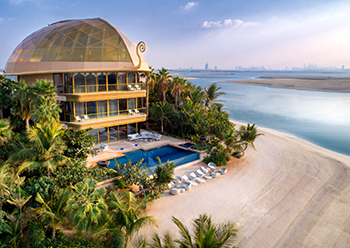 |
|
Eight out of the 10 Sweden Beach Palaces are in the final stages of completion. |
Concept
Kleindienst, who has travelled to several European cities during his childhood and in the course of his career, carries sweet memories of the continent. It was these memories and the best of his European experiences that he intended to bring to Dubai when he decided to develop the project.
For example, when planning the Portofino and Côte d’Azur hotels, Kleindienst says he thought of those two distinct places in Italy and France – and planned two resorts to reflect and recreate a similar ambiance and environment for tourists.
“So, a family won’t have to travel to Italy to experience the charm and lifestyle of Portofino. They will experience the ultimate Italian escape at Portofino at The Heart of Europe where the staff will speak Italian, authentic cuisine will be served, the Euro currency will be accepted and even the time zone will be that of Italy,” he remarks.
Sustainability
In line with Kleindienst’s sustainability goals, some 10 per cent of the electricity of the development is expected to be sourced from solar power. The developer plans to install solar panels all over the civil structures on the island to generate electricity.
The Heart of Europe will also deploy sustainable landscaping – from micro-jungles to giant hanging gardens – that will be pesticide-free, fungicide-free and will be irrigated with recycled water.
The island is also committed to be totally car-free, use clean energy and will eventually offer sustainable water transportation to the guests.
The Heart of Europe was designed with a zero-discharge – which means there won’t be any discharge into the sea water – and zero micro-plastics policy to ensure the protection of the Arabian Gulf and species of marine life that reside around the six islands.
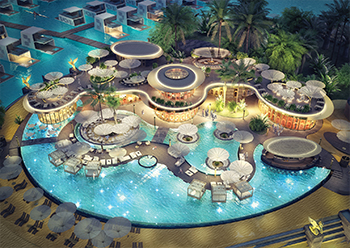 |
|
Honeymoon Island. |
“Zero discharge was almost impossible on an island tourism destination and unthinkable a few years ago. However, it is becoming a reality now, thanks to the development of environmental engineering and technology. We are now able to achieve zero discharge at the Heart of Europe,” Kleindienst says.
The Heart of Europe will also feature an extraordinary sustainable swimming pool measuring a record 12,000 sq m, which will connect the four hotels of the Côte d’Azur resort and will be fully sustainable with fresh water production, recycling and heating generated by solar panels and a zero discharge policy.
Organic food will be served across the destination’s restaurants and cafes and the 24/7 room service offerings, enhancing the aesthetic appeal of the islands with health and wellness attributes.
“The destination hotels will be touchless. The fully integrated hospitality app will enable guests to manage entertainment and dining reservations across the destination directly from their mobiles or to monitor and customise their preferred lighting or temperature settings in their suites on the spot without having to place a call or any waiting time,” Kleindienst remarks.
With sustainability at its core, the Heart of Europe will see the development of more than 500,000 sq m of coral reefs and feature olive trees that are between 100 and 1,500 years old sourced from Andalusia, a region in Spain’s southern coast, and the world’s first climate-controlled Rainy Street and snow plaza.
“At the climate-controlled street covering a 1-km stretch of walkway, it will rain on command maintaining an ambient temperature of 27 degrees C as well as humidity at 60 per cent humidity, to mirror the European summer climate on the island, among many other aspects,” he adds.
The islands will host magnificent hanging gardens on the façade of the Portofino-inspired hotel with an astonishing 100,000 plants. It will also offer sustainable entertainment with zero emissions and with no harm to nature, such as a holographic circuses and synchronised swimming shows.
Among its sustainability initiatives, the islands host the Coral Institute, an in-house research and development centre that will create new coral reefs and help expand the marine eco-system and rebalance the underwater environment. “This is part of Kleindienst Group’s Corporate Social Responsibility (CSR) programme and in line with its vision of sustainable development,” he comments.
Challenges & Covid-19
Being a unique project, the Heart of Europe has brought with it a fair share of challenges.
“Any innovative project goes through trial and error, testing and commissioning phases. In the case of the Heart of Europe, all these developments had to undergo strict testing and commissioning phases. In some cases, products had to be re-designed from scratch to make them sustainable,” Kleindienst points out.
While the Covid-19 outbreak hampered business activities onshore, the Heart of Europe islands have been abuzz with activity, where engineers, consultants and workers have speeded up construction works – thanks to the offshore location and stringent prevention standards that have kept the island safe, dynamic and healthy, he adds.
“During the lockdown, all the 1,200 people who resided on the island, worked overtime thanks to an incentive scheme. It actually greatly contributed to accelerate construction activities during the lockdown.
“Due to its location more than 4 km offshore from Dubai’s Jumeirah coastline, The Heart of Europe has remained completely free from the coronavirus threat. The Heart of Europe management also moved its operations to speed up construction even further and work more closely with the construction teams who have been working from the islands for over five years,” he elaborates.
Kleindienst Group supplied fresh food to the construction teams while a residential chef ensured freshly-processed and cooked food was served to all living and working on the island. A medical team is also on site to monitor the health, safety and well-being of the workers and so far found no symptoms of Covid-19 among them, he adds.
Investor interest
According to Kleindienst, the investor response to The Heart of Europe has been “overwhelming” with Phase One having been sold out.
The Sweden Island, which covers 43,758 sq m including upland and submerged areas, is sold out. with GCC/Middle East nationals – including members of the Saudi royal family – having expressed the most interest in the Sweden Beach Palaces. There is 6 to 12 m space between each property, which is covered by landscaped gardens to provide shade and privacy.
“The Floating Seahorse Villas that were sold initially for Dh5 million – are now valued at Dh20 million. Some of the recent ones were sold at Dh20 million – with a 400 per cent value appreciation!” he exclaims.
Germany Island is constructed in the shape of a horseshoe as a backdrop for the experience of Germany’s inherent rich cultural heritage intertwined with modern concepts of sustainability embedded. Combining superior craftsmanship and smart technology with high quality finish, the architecture of the 32 independent villas, consisting of 17 semi-detached, lagoon villas and 15 beach villas – is Bauhaus style-inspired.
Once complete, Kleindienst expects the luxury leisure tourism island destination to attract international visitors to Dubai.
“In future, international films will be shot on the island – that will become a meeting point for international celebrities!” he concludes.

















.jpg)













 (1).jpg)














































